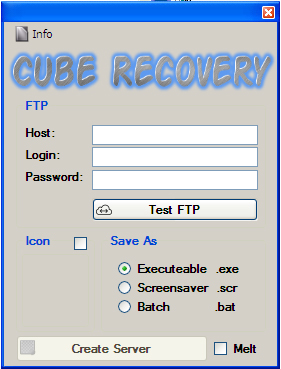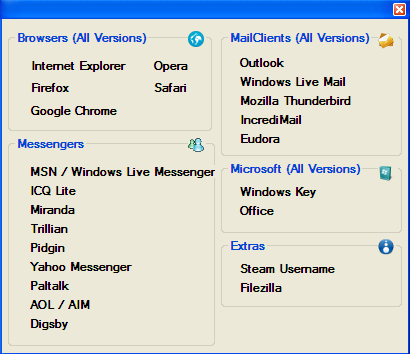HKTL_STEAL
MSIL/Spy.Agent.TU (ESET-NOD32), PSW.MSIL.OVF (AVG), MSIL/Agent.TU!tr.spy (Fortinet), UDS:DangerousObject.Multi.Generic (Kaspersky), Artemis!AD8A711180D7 (McAfee)
Windows 2000, Windows Server 2003, Windows XP (32-bit, 64-bit), Windows Vista (32-bit, 64-bit), Windows 7 (32-bit, 64-bit)


Threat Type: Hacking Tool
Destructiveness: No
Encrypted:
In the wild: Yes
OVERVIEW
This hacking tool arrives as a component bundled with malware/grayware packages.
TECHNICAL DETAILS
Arrival Details
This hacking tool arrives as a component bundled with malware/grayware packages.
NOTES:
This hacking tool displays the following images once executed:

It also displays this image once the user clicked on {Info} button:

It is capable of stealing any of the following information:
- FTP Information
- Serial keys of some applications
- Web browser information
- Email information
- Username of some applications
SOLUTION
Step 1
Before doing any scans, Windows XP, Windows Vista, and Windows 7 users must disable System Restore to allow full scanning of their computers.
Step 2
Note that not all files, folders, and registry keys and entries are installed on your computer during this malware's/spyware's/grayware's execution. This may be due to incomplete installation or other operating system conditions. If you do not find the same files/folders/registry information, please proceed to the next step.
Step 3
Scan your computer with your Trend Micro product to delete files detected as HKTL_STEAL. If the detected files have already been cleaned, deleted, or quarantined by your Trend Micro product, no further step is required. You may opt to simply delete the quarantined files. Please check this Knowledge Base page for more information.
Did this description help? Tell us how we did.


